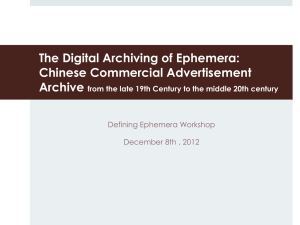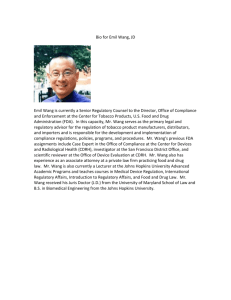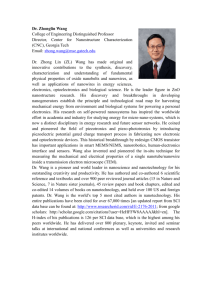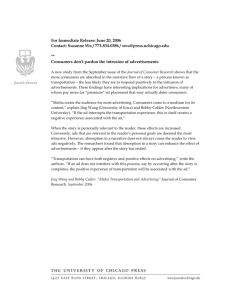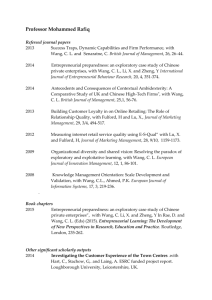Curriculum Vitae - Physics And Astronomy
advertisement
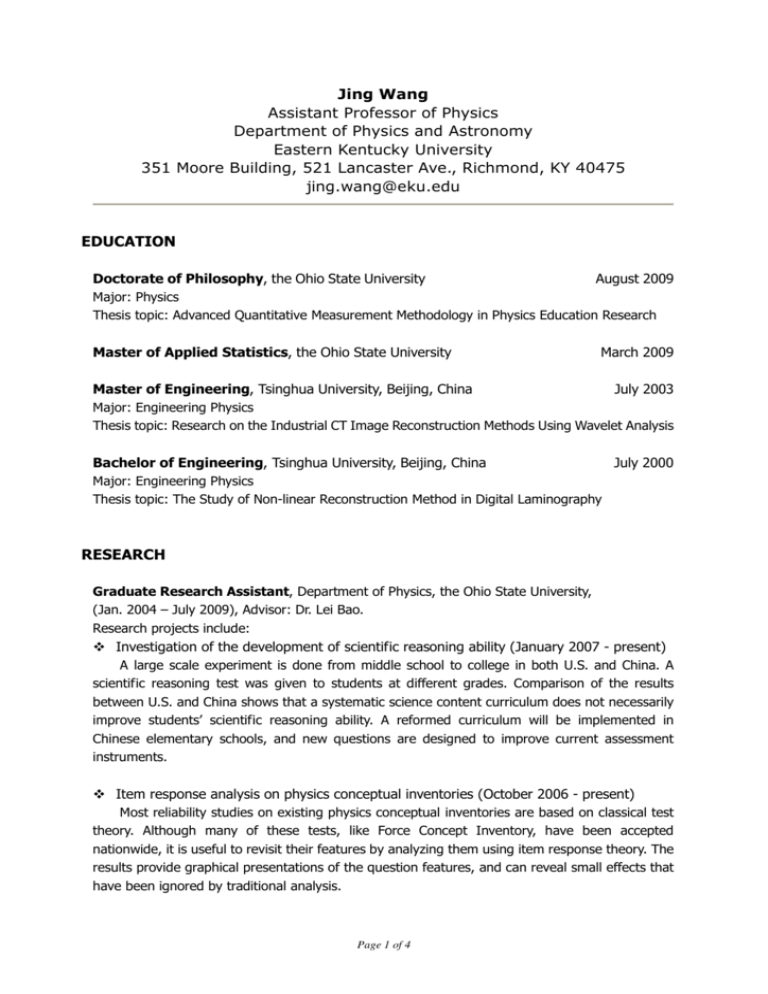
Jing Wang Assistant Professor of Physics Department of Physics and Astronomy Eastern Kentucky University 351 Moore Building, 521 Lancaster Ave., Richmond, KY 40475 jing.wang@eku.edu EDUCATION Doctorate of Philosophy, the Ohio State University August 2009 Major: Physics Thesis topic: Advanced Quantitative Measurement Methodology in Physics Education Research Master of Applied Statistics, the Ohio State University March 2009 Master of Engineering, Tsinghua University, Beijing, China July 2003 Major: Engineering Physics Thesis topic: Research on the Industrial CT Image Reconstruction Methods Using Wavelet Analysis Bachelor of Engineering, Tsinghua University, Beijing, China July 2000 Major: Engineering Physics Thesis topic: The Study of Non-linear Reconstruction Method in Digital Laminography RESEARCH Graduate Research Assistant, Department of Physics, the Ohio State University, (Jan. 2004 – July 2009), Advisor: Dr. Lei Bao. Research projects include: Investigation of the development of scientific reasoning ability (January 2007 - present) A large scale experiment is done from middle school to college in both U.S. and China. A scientific reasoning test was given to students at different grades. Comparison of the results between U.S. and China shows that a systematic science content curriculum does not necessarily improve students’ scientific reasoning ability. A reformed curriculum will be implemented in Chinese elementary schools, and new questions are designed to improve current assessment instruments. Item response analysis on physics conceptual inventories (October 2006 - present) Most reliability studies on existing physics conceptual inventories are based on classical test theory. Although many of these tests, like Force Concept Inventory, have been accepted nationwide, it is useful to revisit their features by analyzing them using item response theory. The results provide graphical presentations of the question features, and can reveal small effects that have been ignored by traditional analysis. Page 1 of 4 Jing Wang, Curriculum Vita Continued Switch effect and its application in quantitative assessment (January 2006 - present) A switch-pair is defined as two specifically designed questions with identical physics knowledge but slightly different context features. By altering the order of these two questions, we get significantly different response patterns of the students. As the next step, we plan to do interviews and physical measurements on students who are doing these switch-pair questions. Conceptual priming in multiple choice questions (January 2006 – July 2006) Based on previous research, a hypothesis was proposed that the activation of students’ deeper layers knowledge may have an effect on student applications of their basic concepts in varying contexts. To test the hypothesis, I designed a series of questions based on existing understanding of popular student mental models. Significant difference between student responses to questions of familiar and novel context features was observed. Item rearrangement and its impact on student performance (March – April, 2006) Instructors of a large scale class often create multiple versions of tests by altering the order of questions to prevent cheating. In winter quarter 2006, I collected existing data from a midterm, and analyzed the item difficulty and student performance on the exam. The fairness of multiple-version in this exam was proved by the analysis. TEACHING EXPERIENCES Instructor, Richmond, Kentucky Voluntary Instructor in Science by Inquiry, Hilliard, Ohio Instructor in Physics by Inquiry, the Ohio State University Graduate Student Lab Sergeant, the Ohio State University Lab Instructor, the Ohio State University Recitation Instructor, the Ohio State University Aug. 2009 – Current Nov. 2008 – June 2009 Jan. 2008 – Dec. 2008 Sep. 2006 – Aug. 2007 Jan. 2006 – June 2007 Sep. 2004 - Dec. 2005 PUBLICATIONS AND PRESENTATIONS Publications 1. Bao, L., Cai, T., Koenig, K., Fang, K., Han, J., Wang, J., Liu, Q., Ding, L., Cui, L., Luo, Y., Wang, Y., Li, L., Wu, N. Learning and scientific reasoning. Science, 323(5914), 586-587 2. Wang, J., and Li, Z., Detecting image edge from projections using radon transform properties, Nuclear Electronics & Detection Technology, 2004(3) 3. Wang, J., Li, Z., Liu, Y. et al, The study of non-linear reconstruction method in digital laminography, Nuclear Electronics & Detection Technology, 2002(1) 4. Li, Z., Wang, J., Cheng, J. et al, Nondestructive inspection with micro focus X-ray laminography, Nondestructive Inspection, 2002(24) 5. Ming, M., Li, Z., Wang, J. et al, Study of limited angle swing laminography and its application in the inspection of flat components, Nuclear Technology, 2002(8) Page 2 of 4 Jing Wang, Curriculum Vita Continued 6. Li, Z., Ming, M., Wang. J. et al, Study on Limited Projections in Micro-focus X-ray Swing Laminography, Atomic Energy Science and Technology, 2002(1) Invited presentations 1. Jing Wang, The procedures and Methods of Physics Education Research, Beijing Jiaotong University, Beijing, China, December 2008 2. Jing Wang, Item Response Theory and Inquiry-based Education, Beijing Normal University, Beijing, China, December 2008 3. Lei Bao and Jing Wang, Switch Effect in Quantitative Assessment: Models, Techniques and Applications, Physics Educations Research Conference, Syracuse NY, July 2006 Contributed Presentations and Posters 1. Wang, J., Han, J., Feng, X., Koenig, K., and Bao, L., Statistical analysis of developmental data of scientific reasoning ability. American Association of Physics Teachers Conference, Chicago, IL, Feb. 2009 2. Wang, J., Han, J., Feng, X., Koenig, K., and Bao, L., Development of Scientific Reasoning skills in K-12 Education of the United States and China. American Association of Physics Teachers Conference, Chicago, IL, Feb. 2009 3. Koenig, K., Cai, T., Han, J., Wang, J. & Bao, L., Assessing middle school, high school, and college students’ reasoning ability. American Association of Physics Teachers Conference, Alberta, Canada, July 2008 4. Koenig, K., Cai, T., Han, J., Wang, J. & Bao, L., Student scientific reasoning ability and academic performance. American Association of Physics Teachers Conference, Alberta, Canada, July 2008 5. Jing Wang and Lei Bao, An item Response Analysis of Existing Concept Surveys, American Association of Physics Teachers Conference, Greensboro NC, July 2007 6. Jing Wang and Lei Bao, An Item Response Analysis of Frce Concept Inventory, Foundations and Frontiers in Physics Education Research Conference, Bar Harbor ME, Aug. 2007 7. Jing Wang and Lei Bao, Item Rearrangement and Its Impact on Student Performance, Physics Educations Research Conference, Syracuse NY, July 2006 8. Jing Wang and Lei Bao, Conceptual Priming in Multiple Choice Questions, AAPT Announcer 36 (2) P 78, 2006 9. Jing Wang and Lei Bao, Transfer or Not: Depends on the question, AAPT Announcer 36 (2) P 119, 2006 10. Lei Bao and Jing Wang, A Switch Effect in Concept Test Questions, AAPT Announcer 36 (2) P 78, 2006 11. Lei Bao and Jing Wang, Switch Effect in Concept Test: Designs and Applications, AAPT Announcer 36(2) P118, 2006 12. Jing Wang and Lei Bao, Using Question Sequences to Probe Ontology Shift, AAPT Announcer 35(4) P 63, 2006 13. Jing Wang, Pengfei Li, Homeyra Sadaghiani, Neville Reay and Lei Bao, Developing Voting Machine Questions for Introductory Physics Courses, AAPT Announcer 34(4) P 111, 2005 14. Lei Bao, Florin Bocaneala and Jing Wang, Measurement and Modeling of Student Group Learning Behaviors, AAPT Announcer 34(4) P 75, 2005 Page 3 of 4 Jing Wang, Curriculum Vita Continued 15. Pengfei Li, Jing Wang, Neville Reay and Lei Bao, Using Voting Machine Data for Assessment, AAPT Announcer 34(4) P 111, 2005 OTHER EXPERIENCES Supervisor of Simple Machines session in Ohio Science Olympiad Apr. 2008 The Ohio Science Olympiad is sponsored by the Ohio State University and Science Education Council of Ohio. Speaker of New Graduate Student Teaching Assistant Orientation Sep. 2007 The Physics Department of the Ohio State University holds its new-coming GTA orientation every September. Judge of Central Ohio Regional Science and Engineering Fair The Ohio State Science Day is run by the Ohio Academy of Sciences. Mar. 2006 Referee for Journal Submissions Oct. 2005 – Apr. 2006 I participated in a graduate student review for Physical Review Special Topics – Physics Education Research. PROFESSIONAL MEMBERSHIP American Association of Physics Teachers American Physics Society since 2004 since 2007 COMPUTER SKILLS Microsoft Office software: Word / FrontPage / Excel / PowerPoint Mathematical programming language and software: C & C++ / Mathematica / Matlab Statistical programming language and software: SPSS / SAS / R / JMP / Minitab Item Response Theory analysis software: MultiLOG Page 4 of 4


